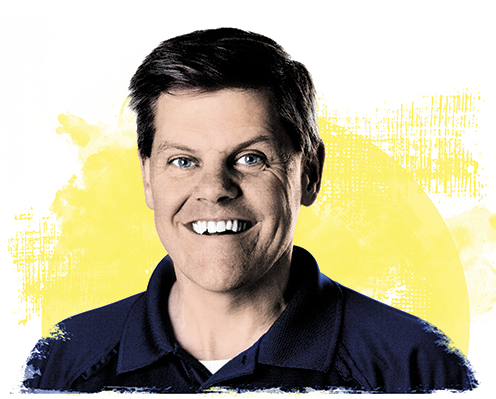AMERICAN MOTORCYCLIST OCTOBER 2018
MORE THAN RACING
Advocating For The Future Of Motorcycling

It is surprising to hear about motorcyclists who don’t have any idea what the AMA is or what the organization does for motorcycling. Even more surprising is hearing about AMA members who don’t know. The most frustrating sentiment to hear expressed is that the AMA is “only a racing organization.” Anyone who harbors that misconception just isn’t paying attention.
In fact, the mission of the AMA is to promote the motorcycle lifestyle and protect the future of motorcycling. The AMA promotes the motorcycle lifestyle in a variety of ways, and sanctioning races around the country throughout the year is just one of them. Racing, is in fact, a mechanism for the organization to grow its membership so that it can be a larger and more effective advocate for the rights of motorcyclists.
The AMA has for many years, maintained a professional staff in Washington, D.C., whose job it is to look after the interests of motorcyclists and take steps to protect those interests when they are in danger of being trampled upon at any level of government. The most effective means of communicating with policymakers is through their constituents. That is why we issue AMA Action Alerts and ask our members and even non-members to contact their legislators to let them know how they feel about a particular issue affecting motorcyclists. Your voice carries much more weight when others are communicating the same message. The more voices there are, the louder and stronger the message is conveyed.
There are so many threats currently facing motorcycling. There are more non-motorcyclists that don’t understand our lifestyle than there are those of us who ride. It stands to reason, then, that our interests are underserved in the U.S. Congress and other elected bodies across the country. It is easy to see how misguided laws can get enacted that adversely affect motorcycling.
Consider the topic of the feature story of this magazine. Motorcyclists in New York City are being subjected to heavy-handed enforcement by the New York City Police Department including the issuance of citations to motorcyclists for minor infractions, the impounding of motorcycles, the employment of motorcycle-only checkpoints and the misapplication of laws. The NYPD is justifying this over-zealous enforcement by claiming that it is part of the city’s Vision Zero Action Plan.
Vision Zero is a national movement that promotes a goal of zero traffic deaths. While this is certainly a laudable goal, the potential exists for policymakers to claim that the only way they can get to zero motorcycling deaths is to eliminate motorcycles from the roadways. If you think this couldn’t happen, look at the actions of the NYPD in this context. It is not a leap to suggest that what they are doing is intended to deter people from riding motorcycles by making riding such a hassle that riders give it up.
I have written quite a lot in this column space regarding autonomous vehicles and their potential detriment to motorcycling. In the government relations section of this magazine, you can read about the AMA’s Autonomous Vehicle position statement, recently adopted by the AMA Board of Directors.
The possible safety advantages of autonomous vehicles cannot be denied. However, if automated vehicle technology is not designed to detect motorcycles, it would again not be a leap to think that non-motorcyclist policymakers could be persuaded that the advantages of autonomous vehicles without the ability to detect a motorcycle far outweigh the privilege of a minority of road users who choose to ride a motorcycle. I use the word, “privilege” intentionally to demonstrate that operating any motor vehicle on our nation’s roadways is not a right guaranteed to any of us by any authority, rather it is indeed a privilege, typically bestowed upon us by a motor vehicle licensing agency. Such an agency could just as likely be legislatively directed by elected officials to no longer allow individuals the privilege of operating a motorcycle, particularly if it is done in the name of safety, or quite possibly, in the name of zero traffic deaths—aka, Vision Zero.
There also continues to be an all-out effort on behalf of corn farmers to require more ethanol to be blended into our motor fuel. I don’t know about you, but I have experienced firsthand what ethanol can do to motorcycle fuel systems.
This is another government mandate that did not adequately consider the adverse effects on the motorcycling community in the first place, and those who benefit financially from the initiative want to continue to expand it. There is not a single motorcycle currently available for sale in this country that is approved to run on E15, which as you know is motor fuel with up to 15 percent ethanol. Efforts to force more ethanol into the fuel we use will make it more difficult if not impossible for motorcyclists to fill their tanks with E10 or E0.
As if these types of threats are not enough, the motorcycle industry continues to face economic headwinds. The motorcycle industry never fully recovered from the Great Recession. If more motorcyclists don’t join together to speak with a common voice through the AMA, it is likely that it never will completely recover.
Promoting the motorcycle lifestyle and protecting the future of motorcycling has become a complicated endeavor. Rest assured that the AMA is more than “just a racing organization” and is the premier advocate for the motorcycle lifestyle. The AMA will continue to do everything possible to protect your right to ride.
Rob Dingman is AMA president and CEO.
